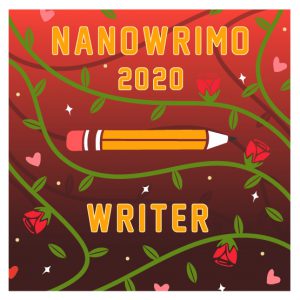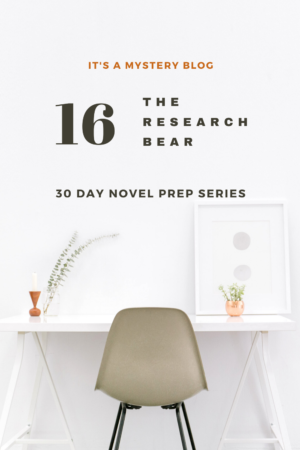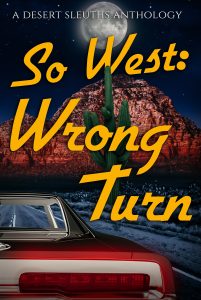Research for a novel can be a real bear because it is critical to get the facts right for your readers, but too much can derail your writing completely. How much research do you need and when should you do it?

Maybe you think you don’t need to do research at all. It’s fiction after all. You make it all up in your head, right?
A few months ago while engrossed in a mystery novel, the main character stated the official language of Hong Kong was Mandarin. It popped me right out of the story like I’d hit the button of an ejector seat. The official language of Hong Kong is Cantonese (don’t ask how I remember that). How did the author make a mistake like that? I did finish reading the novel, but in a corner of my mind I started questioning everything about it. If the author was that sloppy, what else was wrong? It destroyed my enjoyment of the book.
What should you research prior to writing?
First of all, you should research the big items that move your plot.
For example, unless you are working in the same field as your protagonist, you will probably need to investigate the job description of whatever profession you chose for them. Find out what kind of education they would need, where they might work, jargon specific to the job, etc. If you have a friend or family member in that or a similar field, it might be a good time to write, text, or pick up the phone. You need to get it right or you will hear from every expert in that field.
Setting is important, so you need to review that. Do you have a concrete description of your setting in place?
Also, if you are going to add some special details to add depth to the story, get those sorted. Yesterday I listened to a virtual talk by mystery author Ian Rankin about his new book, A Song for the Dark Times. He mentioned featuring a World War II internment camp in the book. If you are going to write about historic events or places, it would be a good idea to research those ahead of time, especially if your research will require trips to a university library for scholarly works.
Tip: Looking for different ways to learn more about a topic? Consider podcasts. Find one or two podcasts by experts in a field and listen while you exercise or do housework. Yes, you can sometimes multitask successfully.
Should you research while writing?
Ever clicked on your browser to look up a synonym of a word and come back 45 minutes later after you found yourself watching cute cat videos? Yes, the internet can be a distracting place. For the most part, you should plan to limit the amount of internet research you do when writing for an intense deadline like NaNo. Many writers turn off their browsers completely.
If you have smaller points to fill in, there are ways to remind yourself to come back later and continue writing. Journalists use the abbreviation TK, which is shorthand for “to come.” You can also use your own code, but make it something that it is easy to locate via the “find” command.
“You’re going to Hong Kong? How will you communicate?”
“Don’t worry, I’m fluent in {{add language of Hong Kong}}.
Need to check something that is critical to your next scene, that you need to clarify to keep writing? Set a timer before you start your search.
Caveats
1. If you enjoy research, sometimes you want to share all the exciting things you found. The problem is that sharing can turn into an information dump, which will clog up your story and turn off readers. All those wonderful things you find out should support your story, but not weigh it down.
Visualize an iceberg. Your readers should see the exposed tip as if that’s all you created. You see the entire thing, including all the massive amount of material hidden under the water. That hidden mass is what stabilizes the tip and makes it work properly, but they don’t need to know it is there.
2. Sometimes the true facts just won’t work. Then it is time to fabricate. Don’t be afraid to own that,
3. Nothing is finer than reading a well-researched book that help you learn something new in the midst of a satisfying story. On the other hand, if you spend years and years gathering the background material, it can get in the way of actually doing any writing. Only you can determine the balance, when you are done and when you are ready to write.
Exercise:
The next time you are reading a novel, pay attention to the facts and details that the author shares. Do they talk about downturns in the economy, nuclear power, or how to get fingerprints off a cell phone? You might want to even highlight those passages. Begin to be aware of how much fact goes into writing fiction.
Now go do some research!

#####
Visit our 30 Day Novel Prep Page for all the links.




This is a very interesting post and spot on! I love a book where you can see the author did good research. I call those books google-able. I love reading a book and if you want to check it, google it. If the facts are off, I’m put-off by the book.
Hope you are enjoying a good weekend!
Elza Reads
“Google-able” is a good way to think about it. Thanks for visiting.